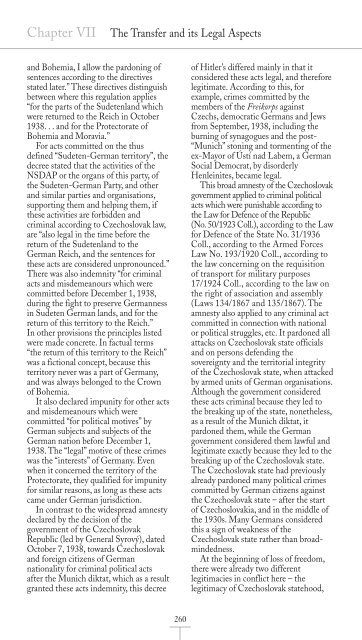the nationality of all inhabitants of the czech provinces and ...
the nationality of all inhabitants of the czech provinces and ...
the nationality of all inhabitants of the czech provinces and ...
Create successful ePaper yourself
Turn your PDF publications into a flip-book with our unique Google optimized e-Paper software.
Chapter VII The Transfer <strong>and</strong> its Legal Aspects<br />
<strong>and</strong> Bohemia, I <strong>all</strong>ow <strong>the</strong> pardoning <strong>of</strong><br />
sentences according to <strong>the</strong> directives<br />
stated later.” These directives distinguish<br />
between where this regulation applies<br />
“for <strong>the</strong> parts <strong>of</strong> <strong>the</strong> Sudetenl<strong>and</strong> which<br />
were returned to <strong>the</strong> Reich in October<br />
1938. . . <strong>and</strong> for <strong>the</strong> Protectorate <strong>of</strong><br />
Bohemia <strong>and</strong> Moravia.”<br />
For acts committed on <strong>the</strong> thus<br />
defined “Sudeten-German territory”, <strong>the</strong><br />
decree stated that <strong>the</strong> activities <strong>of</strong> <strong>the</strong><br />
NSDAP or <strong>the</strong> organs <strong>of</strong> this party, <strong>of</strong><br />
<strong>the</strong> Sudeten-German Party, <strong>and</strong> o<strong>the</strong>r<br />
<strong>and</strong> similar parties <strong>and</strong> organisations,<br />
supporting <strong>the</strong>m <strong>and</strong> helping <strong>the</strong>m, if<br />
<strong>the</strong>se activities are forbidden <strong>and</strong><br />
criminal according to Czechoslovak law,<br />
are “also legal in <strong>the</strong> time before <strong>the</strong><br />
return <strong>of</strong> <strong>the</strong> Sudetenl<strong>and</strong> to <strong>the</strong><br />
German Reich, <strong>and</strong> <strong>the</strong> sentences for<br />
<strong>the</strong>se acts are considered unpronounced.”<br />
There was also indemnity “for criminal<br />
acts <strong>and</strong> misdemeanours which were<br />
committed before December 1, 1938,<br />
during <strong>the</strong> fight to preserve Germanness<br />
in Sudeten German l<strong>and</strong>s, <strong>and</strong> for <strong>the</strong><br />
return <strong>of</strong> this territory to <strong>the</strong> Reich.”<br />
In o<strong>the</strong>r provisions <strong>the</strong> principles listed<br />
were made concrete. In factual terms<br />
“<strong>the</strong> return <strong>of</strong> this territory to <strong>the</strong> Reich”<br />
was a fictional concept, because this<br />
territory never was a part <strong>of</strong> Germany,<br />
<strong>and</strong> was always belonged to <strong>the</strong> Crown<br />
<strong>of</strong> Bohemia.<br />
It also declared impunity for o<strong>the</strong>r acts<br />
<strong>and</strong> misdemeanours which were<br />
committed “for political motives” by<br />
German subjects <strong>and</strong> subjects <strong>of</strong> <strong>the</strong><br />
German nation before December 1,<br />
1938. The “legal” motive <strong>of</strong> <strong>the</strong>se crimes<br />
was <strong>the</strong> “interests” <strong>of</strong> Germany. Even<br />
when it concerned <strong>the</strong> territory <strong>of</strong> <strong>the</strong><br />
Protectorate, <strong>the</strong>y qualified for impunity<br />
for similar reasons, as long as <strong>the</strong>se acts<br />
came under German jurisdiction.<br />
In contrast to <strong>the</strong> widespread amnesty<br />
declared by <strong>the</strong> decision <strong>of</strong> <strong>the</strong><br />
government <strong>of</strong> <strong>the</strong> Czechoslovak<br />
Republic (led by General Syrový), dated<br />
October 7, 1938, towards Czechoslovak<br />
<strong>and</strong> foreign citizens <strong>of</strong> German<br />
<strong>nationality</strong> for criminal political acts<br />
after <strong>the</strong> Munich diktat, which as a result<br />
granted <strong>the</strong>se acts indemnity, this decree<br />
260<br />
<strong>of</strong> Hitler’s differed mainly in that it<br />
considered <strong>the</strong>se acts legal, <strong>and</strong> <strong>the</strong>refore<br />
legitimate. According to this, for<br />
example, crimes committed by <strong>the</strong><br />
members <strong>of</strong> <strong>the</strong> Freikorps against<br />
Czechs, democratic Germans <strong>and</strong> Jews<br />
from September, 1938, including <strong>the</strong><br />
burning <strong>of</strong> synagogues <strong>and</strong> <strong>the</strong> post-<br />
“Munich” stoning <strong>and</strong> tormenting <strong>of</strong> <strong>the</strong><br />
ex-Mayor <strong>of</strong> Ústí nad Labem, a German<br />
Social Democrat, by disorderly<br />
Henleinites, became legal.<br />
This broad amnesty <strong>of</strong> <strong>the</strong> Czechoslovak<br />
government applied to criminal political<br />
acts which were punishable according to<br />
<strong>the</strong> Law for Defence <strong>of</strong> <strong>the</strong> Republic<br />
(No. 50/1923 Coll.), according to <strong>the</strong> Law<br />
for Defence <strong>of</strong> <strong>the</strong> State No. 31/1936<br />
Coll., according to <strong>the</strong> Armed Forces<br />
Law No. 193/1920 Coll., according to<br />
<strong>the</strong> law concerning on <strong>the</strong> requisition<br />
<strong>of</strong> transport for military purposes<br />
17/1924 Coll., according to <strong>the</strong> law on<br />
<strong>the</strong> right <strong>of</strong> association <strong>and</strong> assembly<br />
(Laws 134/1867 <strong>and</strong> 135/1867). The<br />
amnesty also applied to any criminal act<br />
committed in connection with national<br />
or political struggles, etc. It pardoned <strong>all</strong><br />
attacks on Czechoslovak state <strong>of</strong>ficials<br />
<strong>and</strong> on persons defending <strong>the</strong><br />
sovereignty <strong>and</strong> <strong>the</strong> territorial integrity<br />
<strong>of</strong> <strong>the</strong> Czechoslovak state, when attacked<br />
by armed units <strong>of</strong> German organisations.<br />
Although <strong>the</strong> government considered<br />
<strong>the</strong>se acts criminal because <strong>the</strong>y led to<br />
<strong>the</strong> breaking up <strong>of</strong> <strong>the</strong> state, none<strong>the</strong>less,<br />
as a result <strong>of</strong> <strong>the</strong> Munich diktat, it<br />
pardoned <strong>the</strong>m, while <strong>the</strong> German<br />
government considered <strong>the</strong>m lawful <strong>and</strong><br />
legitimate exactly because <strong>the</strong>y led to <strong>the</strong><br />
breaking up <strong>of</strong> <strong>the</strong> Czechoslovak state.<br />
The Czechoslovak state had previously<br />
already pardoned many political crimes<br />
committed by German citizens against<br />
<strong>the</strong> Czechoslovak state – after <strong>the</strong> start<br />
<strong>of</strong> Czechoslovakia, <strong>and</strong> in <strong>the</strong> middle <strong>of</strong><br />
<strong>the</strong> 1930s. Many Germans considered<br />
this a sign <strong>of</strong> weakness <strong>of</strong> <strong>the</strong><br />
Czechoslovak state ra<strong>the</strong>r than broadmindedness.<br />
At <strong>the</strong> beginning <strong>of</strong> loss <strong>of</strong> freedom,<br />
<strong>the</strong>re were already two different<br />
legitimacies in conflict here – <strong>the</strong><br />
legitimacy <strong>of</strong> Czechoslovak statehood,


